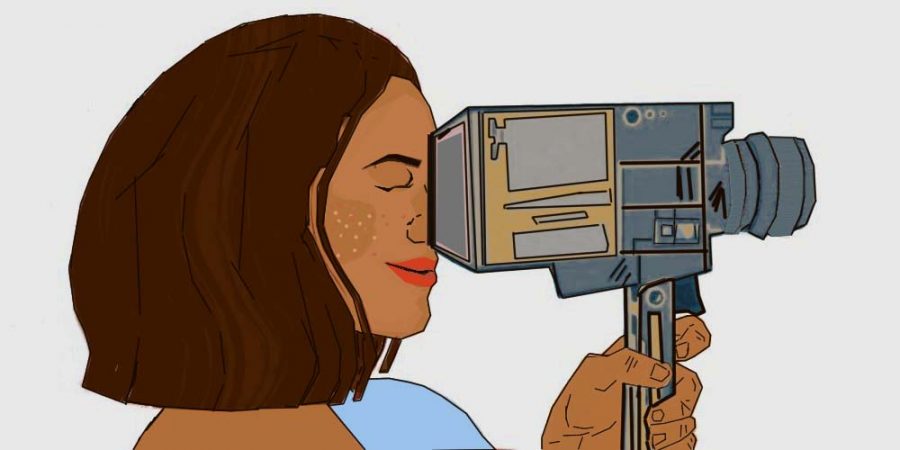Opinion | Patriarchy keeps female films from succeeding
January 8, 2020
The film industry as we know it is (finally) expanding to make room for more female stories. Several of these stories, for women and about women, were released this year. Some of these films, like “Captain Marvel” and “Frozen 2,” made more than $1 billion each. However, there are several films by female directors and screenwriters, especially those of color, that are either unknown or are famous for absolutely tanking in the box office.
One example of these films is “Charlie’s Angels” (2019). “Angels” had a lot going for it, but still had an abysmal opening weekend, only making approximately $8 million — to put this in perspective, “Cats” made $6.5 million its opening weekend. At the end of its run in theaters, it still managed to break even, with a gross of $64 million and a budget of $48 million, but a quick Google search shows that it is widely regarded as a flop.
As someone who appreciates film a great deal, I thought “Charlie’s Angels” was so good that I saw it twice. The film was funny, full of entertaining action and had a very solid narrative. I never thought it would be winning any Oscars, but it was very fun to watch. I thought that this movie was no better or worse than all of the male-led/male-directed/male-written action movies I have sat through in my lifetime. Because of this, I was surprised to see that the movie was flopping in terms of critical reviews and finances.
I read numerous reviews, trying to figure out what was lacking, and have found that each individual reviewer has a different bone to pick. Some people didn’t like the script, some people felt the casting was wrong, some people didn’t think the action sequences or the jokes were good. There were two common points that were very discouraging — some expressed this movie couldn’t outdo the original movie in 2000, and some expressed they didn’t appreciate all of the feminist content. The feminist content they’re referring to includes women being exhausted with sexist male employers, numerous male villains and several other female empowerment tropes. This outright proves the point that patriarchy steers audiences away from female stories.
This is troubling for many reasons. “Angels” is not hitting audiences over the head with feminist propaganda. The action simply follows a group of women who are good at their jobs and don’t have love interests. I really liked this version of the movie, because I often feel uncomfortable watching the original movie. The 2000 version, while understandably a product of its time, is very fetishistic in its portrayal of women. There are all kinds of scenes of oversexualization — as well as cultural appropriation — that just don’t hold up today.
The 2000 version of “Angels” features an unnecessary scene of Cameron Diaz dancing around in her underwear, as well as a separate scene that has her licking a steering wheel as part of a distraction. There is also a sequence where Lucy Liu is meant to be a sexy professor, and it’s quite gratuitous. In regard to cultural appropriation, the three women dress as geishas as a disguise, and there is a brief moment where Drew Barrymore is in brownface. All of these moments are quite uncomfortable to watch. I can see how the argument could be made that these moments were a product of their time and a tool to distract potential targets, but the 2019 version avoided these things quite artfully. Rather than relying on their sexuality to get out of challenging situations, the 2019 angels came up with smart solutions and relied on each other.
I love this new version because the characters are relatable people. Sabina lacks social grace and has a troubled past, Jane experiences a loss and has trouble being vulnerable and Elena is a woman whose skills and talents are very often unrealized. Rather than being eye candy or objects that depend upon a male love interest to be interesting, these characters have emotional depth and very strong dramatic needs that pass the Bechdel Test. The sad reality is that large groups of people aren’t interested in viewing women this way, so movies like this aren’t selling, which ultimately keeps them from being made.
The trend continues with numerous other films with female writers, directors and actors, and the next one to focus on is “Booksmart.” It’s the story of Molly and Amy, two bookish girls who decide to go to their first party on the last day of high school. Unlike “Angels,” “Booksmart” is critically acclaimed. It’s gotten stellar reviews. Former President Barack Obama added it to his top movie picks of 2019, and it is performing relatively well in the awards circuit so far. It received a lot of media attention both before and after it was released, but it still did quite poorly in the box office, making less than $7 million opening weekend.
There are many possible reasons for the disappointing box office numbers. “Booksmart” was in an unfortunate situation to begin with because it had to open in competition with movies that were already dominating in the box office. However, I think this movie is yet another result of lack of interest in new female stories.
“Booksmart” is a story about high school girls that look and act like high school girls. They are nerdy, awkward and emotional. We get to see them try and fail at love in a way that isn’t sexually exploitative, but just portrays what a lot of real high school experiences are like. This movie is funny and relatable, and it offers several kinds of representation for minorities — however small. Critics are aware of this, but audiences aren’t, likely because Hollywood has spent years telling us that these aren’t the kind of movies we want to see.
The list just gets longer when you look at 2019 alone. Numerous other movies that are by and for women were flash in the pan this year, and those by and for women of color fared even worse. “Where’d You Go, Bernadette,” “Late Night” and “The Kitchen” are just a couple examples of films that were highly anticipated, but were not highly attended.
The successful films above already have a guaranteed fan base. While “Captain Marvel” does have feminist themes, its affiliation with Marvel will always draw comic book fans. The same can be said for “Frozen 2,” which makes great money because of kids and their parents, as well as nostalgic Disney fans of all ages. “Little Women” has some of the biggest names in show business starring in a story that’s been beloved for years. Even the feminist icon of the story, Jo, ends up married off and running a school by the end of the film, making the feminist themes easier for an audience that doesn’t like feminist themes. None of these things are faults, but these films are easier for all demographics to enjoy.
Whatever the reason for the lack of success of female-led films, I believe that positive change occurs every year. However, failing to recognize the problem and do something about it isn’t enough, especially when part of the solution is to go watch good movies. Despite my frustrations, “Captain Marvel,” “Frozen 2” and “Little Women” are huge successes. It is also important to remember that there is still even more work to do in terms of films created by women of color. Luckily for us, these movies are being made — we just have to go support them.
Alex Dolinger primarily writes satire and columns about entertainment. You can write to Alex at ard108@pitt.edu



